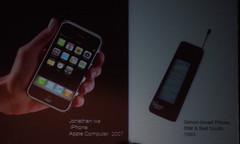 You can ask the oracle about The Next Big Thing. Or you can listen to the tweets of a guy at Oracle thinking about The Next Big Thing at one of our weekly SocialChats. Read top-down and try to fill in the parts of the invisible guys:
You can ask the oracle about The Next Big Thing. Or you can listen to the tweets of a guy at Oracle thinking about The Next Big Thing at one of our weekly SocialChats. Read top-down and try to fill in the parts of the invisible guys:
- For me it is very helpful to distinguish between invention and innovation. If you want to know what is the next big thing, you have to look for the inventions from 10yrs ago.
- 10 years might be the time they need to gain traction in the market and turn into innovation. (innovation := inventions with market success)
- Flying cars is a good example. They exist. They fly!
- E.g. a smartphone similar to the iPhone was invented by IBM in 1993.

- There is no single path through history of technology. The similarity between iPhone and IBM’s device is, that they both are based on touch.
- I think analysts and the press are not close enough to the research labs. They have to provide good stories to entertain their audience. But in the early stages of innovation the stories are hardly existing and not very convincing — like the flying Moller car.
- Bruce Sterling gave up. He says there is nothing left to write about that makes really interesting science fiction.
- Minority Report was a real research project for the science consultants. No science fiction at all. See John Underkoffler’s TED talk.
- Just a shame that we are not using hypertext in the original sense. I mean, why are we satisfied with the current state of the art? May I post another talk? 45′ Ted Nelson at ACM Hypertext 2001
- The question “What’s the next big thing?” is too good to being answered on the spot. What is going on in the research labs now? Provides insights regarding technology. What is missing? Provides insights regarding user adoption.
- Do we have anybody in the chat who participated in Oracle IT2020?
- My IT2020 prediction
- But I have one more. Bill Buxton’s closing keynote at ACM Computer Human Interaction Conference in 2008 really impressed me. There are only my notes left. Basically he draws the connection between the artist and the environment.
- Who would have been Mozart without the forte piano and the concert halls, and a society who appreciates his music?
- The same is true for research scientists and their customers and users.
- And one for the road: reconstructed slides and notes from Bill Buxton’s talk On Being Human in a Digital Age – enjoy! and have a nice weekend. -Matthias
Recommended Podcast: Paul Saffo at Longnow: Embracing Uncertainty – The Secret of Effective Forecasting